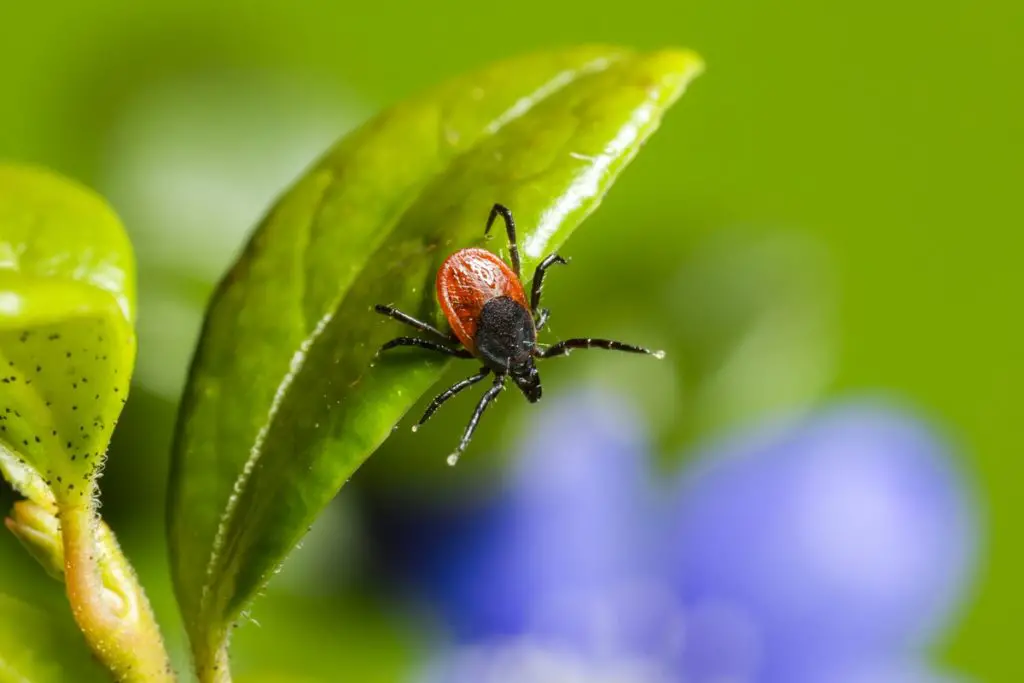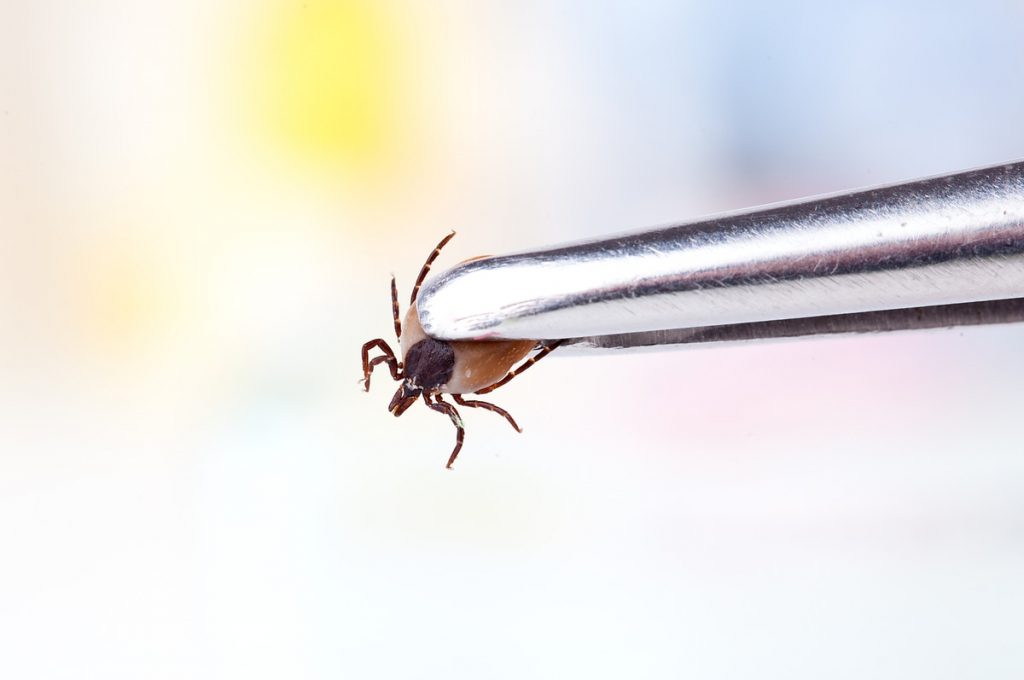If you own a pool in a heavily wooded area, you likely find yourself battling nature quite often. One concern may be ticks and what to do if one gets on you in the pool. Do ticks die in swimming pools?
No, ticks do not die in swimming pools. While ticks cannot swim, they are capable of surviving being submerged in water for multiple days. Normal chlorine levels are not strong enough to kill them either. Regular tick removal procedures should be followed.
Therefore, preventing tick presence should be the priority.
Certain environments welcome ticks, so you’ll want to ensure you aren’t unintentionally attracting them. I’ll go over in this article how to deter ticks from being near your pool area. Also, it’s essential to make sure that you know how to dispose of them properly.

What environments attract ticks?
Ticks are primarily attracted to three main types of areas:
- Heavily wooded areas – Ticks love wooded areas as they attract their favorite animals to feed on.
- Tall grassy areas – Tall grass helps ticks find and latch on to animals or people.
- Moist areas – Dark and moist areas, generally wooded with little sun exposure, are a breeding ground for ticks.
A perfect storm for attracting ticks would be an environment that contains all 3 of the above. This explains why we most often find them deep in the woods! That is where the animals reside, and sun exposure is the most limited.
Tick food sources
Believe it or not, ticks only rely on a single food source – blood. This is why I personally never have any second thoughts about killing one when I find them!
It is also the reason that they are so dangerous. Transmitting blood and bacteria through their mouths is why tick-borne illness is as severe as it is. Ticks spend a considerable amount of time, up to 10 days, sucking the blood from one host before seamlessly moving to another. This can be from animal to animal, animal to human, or human to human.
What plants will keep ticks away?
If your pool is on a property that is attractive to ticks, you should carefully consider your poolside landscaping. There are quite a few dual-purpose plants that can act as a deterrent while still adding beautiful scenery.
According to Buglord.com, some great examples are:

- Marigold – these provide beautiful orange/yellow color and a strong scent that will repel ticks.
- Geranium – these plants produce beautiful flowers and will certainly do the trick because they are toxic to ticks. However, they are also toxic to pets, so they may not be the best solution for everyone.
- Lemongrass – one of the most excellent choices for poolside landscaping. Containing citronella, these plants deter many insects and provide an excellent scent.
- Lavender – often lavender oil is used as a tick repellant, making it an excellent choice. It also complements Lemongrass quite well.
You should be able to find all of these at your local nursery, or you can do like I do and order them online. One of my favorite places to order plants straight to my door is Fast-Growing-Trees.com. Don’t let the name fool you – plants and flowers are available there as well!

Where are ticks usually found on the body?
Given that we know that ticks prefer dark and moist areas, it should be no surprise that some of their favorite spots carry these characteristics. Areas like the armpits, groin, behind the knee, and scalp tend to be tick hotspots.
However, don’t limit your search for these little terrors to just those areas. When we discovered that my daughter had one, hers was in plain sight on her torso a few inches above her belly button!
What you should do if you find a tick on someone
If you find a tick on yourself or someone else, the first thing you should do is to remain calm. Reacting quickly but with the wrong action can do more harm than taking a little longer with proper action.
Ticks burrow their mouths into their prey and begin extracting blood. The earlier you catch them, the easier it will be to remove them.
The most important part is to ensure you remove the tick in its entirety. Often, grabbing a pair of tweezers and grabbing the tick at the mouth/head while gently pulling back will yield the best result. Being rough with the tweezers, gripping it too far back, or pulling quickly can tear the ticks head from its body, leaving it intact.
Once you have done so, you should carefully inspect the area of the bite. Make sure that nothing was left behind, and immediately clean with soap and water or rubbing alcohol.
If you find that you were unsuccessful in the complete removal, it would be best to contact a medical professional for the next steps.

Proper disposal of ticks since drowning isn’t an option
Given that ticks serve no real purpose, I highly recommend killing any that you come in contact with. The best method for doing this is to do the following:
- Grab the following items: Ziploc bag, cotton ball, and rubbing alcohol
- Soak the cotton ball with rubbing alcohol
- Place both the tick and the cotton ball into a Ziploc bag and seal it shut
The natural reaction for most people, myself included, is always to want to flush them down the toilet. As we discussed, this will not kill the tick! They will survive in the water and potentially carry even more bacteria onto their next victim!
Conclusion
At the end of the day, properties in private, wooded areas are some of the best candidates for swimming pools. While exposure to some unpleasantries is possible, it shouldn’t deter you.
Many steps can be taken to deter stray animals, rodents, and unwanted insects from your pool area. One such way is through calculated landscaping, and you can accomplish adding beautiful scenery and eliminating pests at the same time!
If ticks are discovered, submerging them in the pool will not help the cause. Ticks do not die in swimming pools as they will not drown, and the chemicals aren’t strong enough. You must follow proper removal techniques and dispose of the ticks appropriately!
